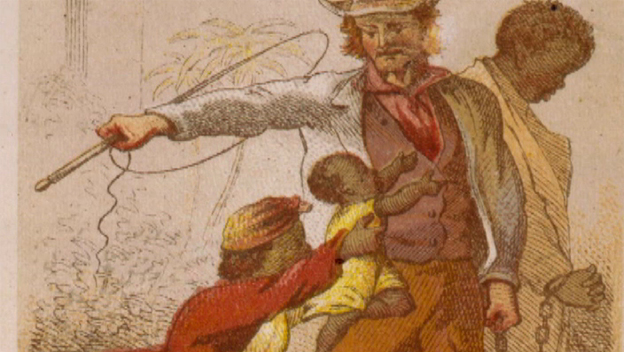by GEORGE YANCY and NOAM CHOMSKY
 In 1619, the Dutch introduced the first captured Africans to America, planting the seeds of a slavery system that evolved into a nightmare of abuse and cuelty that would ultimately divide the nation. IMAGE/History
In 1619, the Dutch introduced the first captured Africans to America, planting the seeds of a slavery system that evolved into a nightmare of abuse and cuelty that would ultimately divide the nation. IMAGE/History
This is the eighth in a series of interviews with philosophers on race that I am conducting for The Stone. This week’s conversation is with Noam Chomsky, a linguist, political philosopher and one of the world’s most prominent public intellectuals. He is the author of many books, including, most recently, “On Western Terrorism: From Hiroshima to Drone Warfare,” with Andre Vltchek.
– George Yancy
George Yancy: When I think about the title of your book “On Western Terrorism,” I’m reminded of the fact that many black people in the United States have had a long history of being terrorized by white racism, from random beatings to the lynching of more than 3,000 black people (including women) between 1882 and 1968. This is why in 2003, when I read about the dehumanizing acts committed at Abu Ghraib prison, I wasn’t surprised. I recall that after the photos appeared President George W. Bush said that “This is not the America I know.” But isn’t this the America black people have always known?
Noam Chomsky: The America that “black people have always known” is not an attractive one. The first black slaves were brought to the colonies 400 years ago. We cannot allow ourselves to forget that during this long period there have been only a few decades when African-Americans, apart from a few, had some limited possibilities for entering the mainstream of American society.
We also cannot allow ourselves to forget that the hideous slave labor camps of the new “empire of liberty” were a primary source for the wealth and privilege of American society, as well as England and the continent. The industrial revolution was based on cotton, produced primarily in the slave labor camps of the United States.
As is now known, they were highly efficient. Productivity increased even faster than in industry, thanks to the technology of the bullwhip and pistol, and the efficient practice of brutal torture, as Edward E. Baptist demonstrates in his recent study, “The Half Has Never Been Told.” The achievement includes not only the great wealth of the planter aristocracy but also American and British manufacturing, commerce and the financial institutions of modern state capitalism.
It is, or should be, well-known that the United States developed by flatly rejecting the principles of “sound economics” preached to it by the leading economists of the day, and familiar in today’s sober instructions to latecomers in development. Instead, the newly liberated colonies followed the model of England with radical state intervention in the economy, including high tariffs to protect infant industry, first textiles, later steel and others.
The New York Times for more